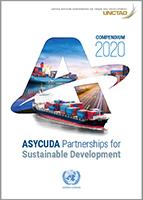
UNCTAD’s Automated System for Customs Data (ASYCUDA) Programme plays a key role supporting countries efforts to mobilize domestic revenues through implementing trade facilitation policies, efficient procedures and regional integration, while building capacity, and safeguarding natural resources.
The ASYCUDA Programme’s focus on reform and automation, the expertise of its many partners, the sustainable economic and social impacts of its projects and its willingness to further expand its trade-related field of work have built trust among 120+ nations and territories since its creation.
The 2020 edition of ASYCUDA’s Compendium of case studies highlights some of the achievements and benefits reported by user-countries following efficient and effective collaboration with the ASYCUDA Programme and trade stakeholders. It further proves the need for and relevance of establishing close partnerships for mobilization of resources for development.
Partnerships not only with government, not only with civil society, with the academia, but particularly partnerships with the business community in the context of this perspective of implementation of the Sustainable Development Goals […], creating the conditions for an inclusive and sustainable development, [are] the best way to prevent crisis and conflict in today’s world.
António Guterres
UN Secretary-General


